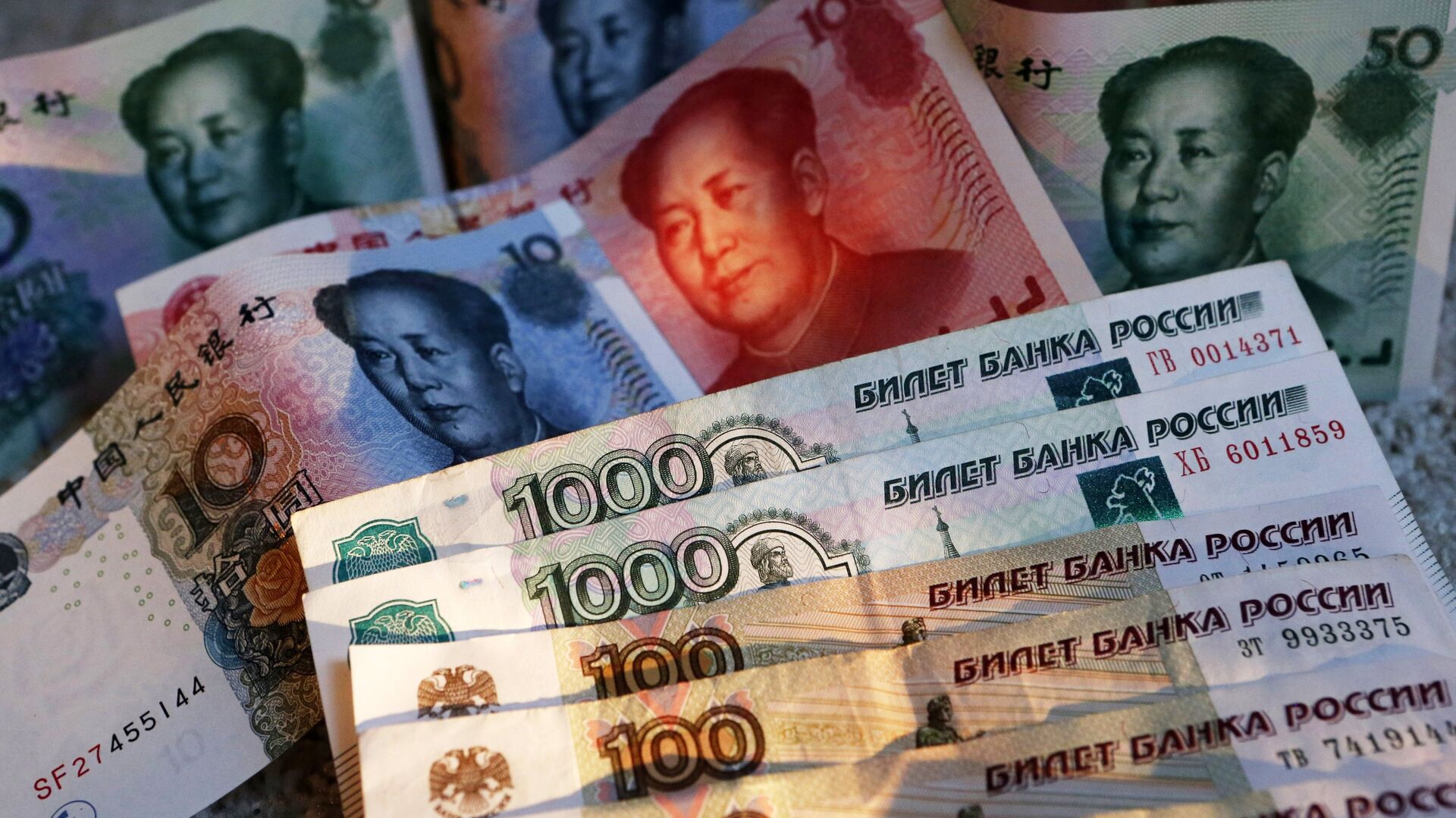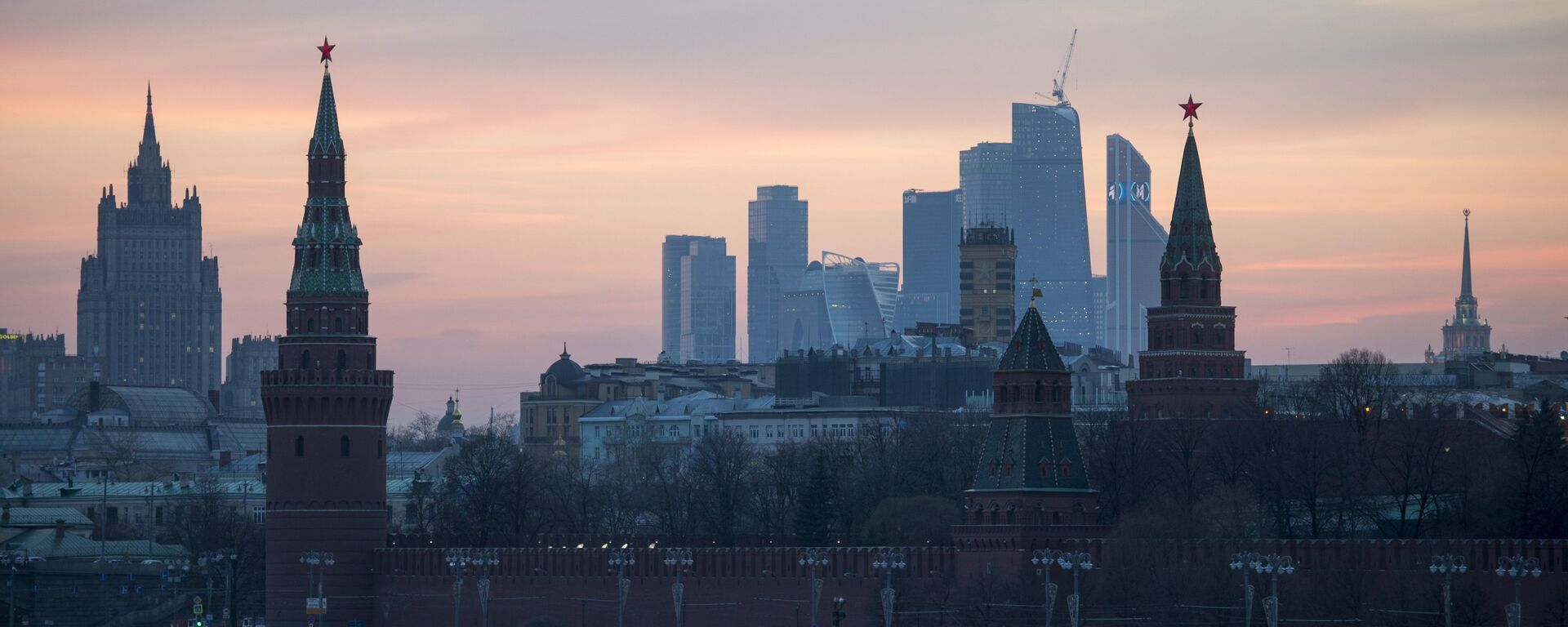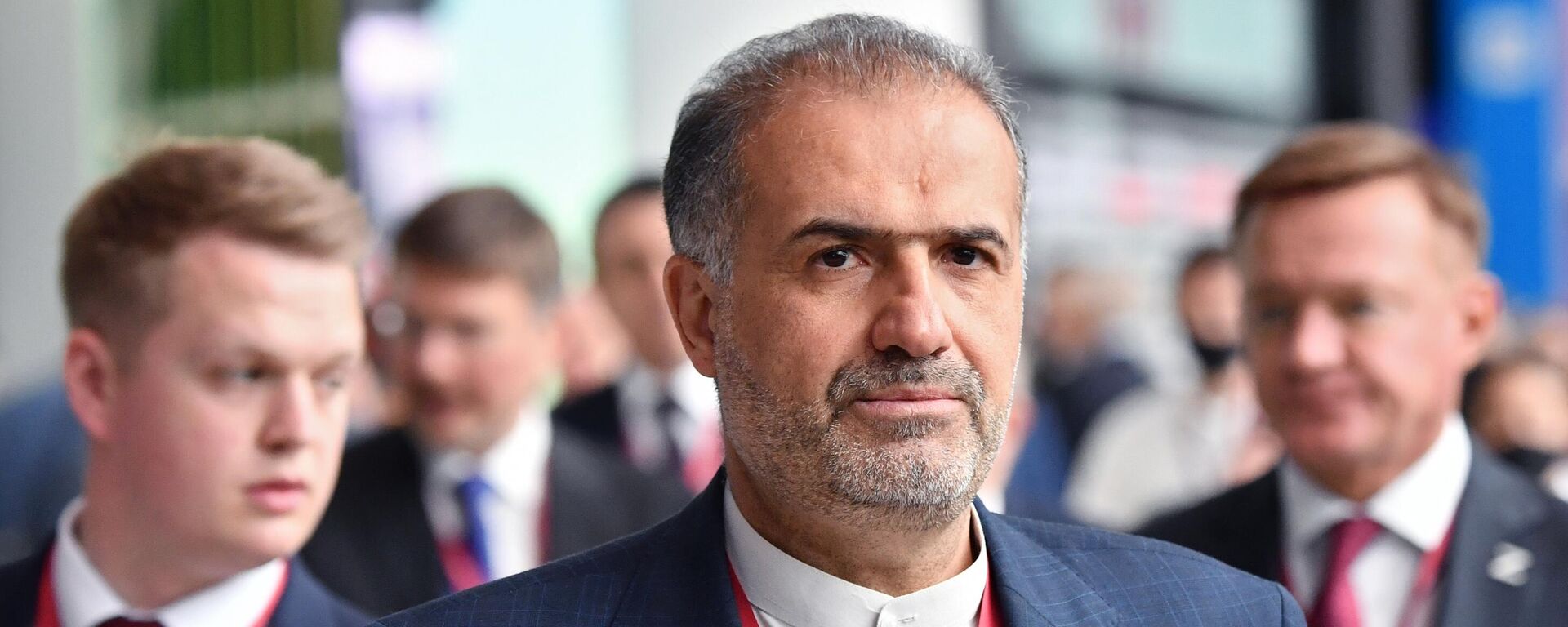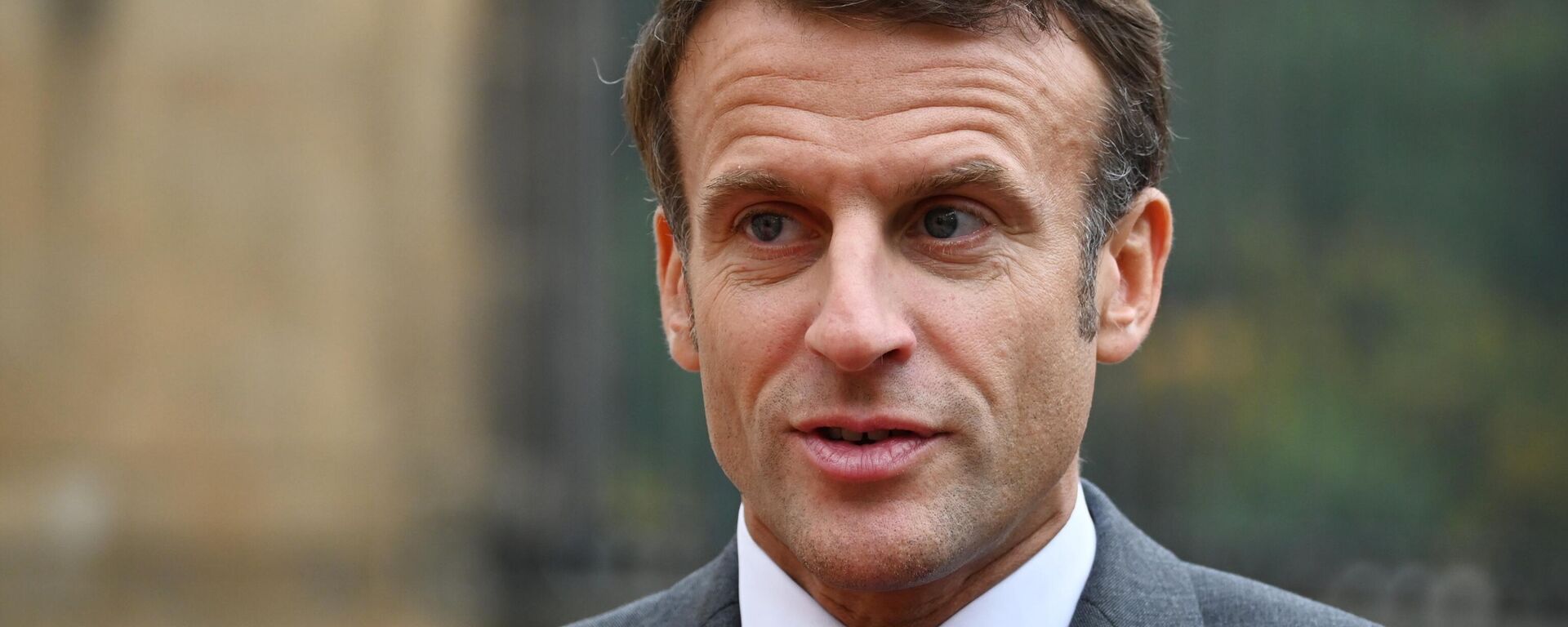https://sputnikglobe.com/20230616/western-sanctions-made-russia-safe-harbor-against-inflation-for-global-investors-1111226476.html
Western Sanctions Made Russia Safe 'Harbor' Against Inflation for Global Investors
Western Sanctions Made Russia Safe 'Harbor' Against Inflation for Global Investors
Sputnik International
Western sanctions intended to cripple the Russian economy have instead opened up a range of new opportunities over the last year and a half, economic experts told Sputnik.
2023-06-16T18:12+0000
2023-06-16T18:12+0000
2023-06-16T18:12+0000
analysis
st. petersburg economic forum
vladimir putin
eurasian economic union
inflation
brics
https://cdn1.img.sputnikglobe.com/img/107145/52/1071455222_0:129:3187:1921_1920x0_80_0_0_e91eda67f64d6896a38ccdab9cd25ab2.jpg
At the St. Petersburg Economic Forum on Friday, Russian President Vladimir Putin described how Russia’s turn toward African and Asian economic partners was well underway by the time the West imposed economic sanctions on Russia in early 2022 - part of a global dynamic of moving toward a multipolar world order and away from one centered on Europe and the United States.Economic experts told Sputnik that while the Russian economy is already an attractive place to invest, Western sanctions were still intimidating many potential partners. They also noted that this could be counteracted by taking further actions to stabilize Russian markets and by deepening Russia’s relationship with other nations, especially other BRICS partners."We opened the doors to international partners a long time ago, since 2014, after the first wave of sanctions that were imposed against the Russian Federation by unfriendly countries. And we see that foreign partners from friendly countries have not been entering our market very confidently," said financial markets analyst Nikolay Solabuto."This movement on the part of Western partners of friendly countries does not occur. And he says that we are specifically allocating huge funds for organizing import substitution of goods and services within the country. And we are talking about the role of VEB as a guarantor of this movement. We see the allocation of budgetary funds for the implementation of these projects, to stimulate activity on the part of entrepreneurs, to enter into these projects to replace goods and services - that is, those firms that have left Russia," he said.'Inflation Was Supposed to Storm the Heights'On the subject of inflation, which has not plagued Russia as it has Western nations, Solabuto noted that mitigation efforts have been successful in spite of the "very great pressure" the West has attempted to put on the Russian economy via sanctions.He noted that with inflation of the ruble at just 2.9%, there is “almost twice as much” in the Eurozone and United States, the latter of which is only recently seeing such low inflation numbers.“They say about our national currency, our economy, and our country that we are protected from external storms, [that we are someone] who can walk the global market, and thus we are protected,” he observed.Supply and DemandIn his speech, Putin noted that Russia has the potential to become a "supply" economy on the global stage. This, Solabuto explained, is the opposite of what the US does as a demand-side economy.He explained that Russia's path toward this goal would include "the construction of enterprises within the country that will produce more goods and services, including replacing those products that we used to import from overseas."Opportunities for BRICS in Russia"For new partners, for the BRICS [Brazil, Russia, India, China, South Africa] countries, the Russian market may be of interest because of its size," said Professor Yaroslav Lissovolik, founder of "BRICS+ Analytics" and member of the Russian International Affairs Council.“Another aspect of the attractiveness and importance of the Russian market for partners from the BRICS countries is that there is an opportunity to strengthen their positions in the Russian market in order to use the Russian market as a platform for expanding their presence in the countries of the Eurasian region,” including the Eurasian Economic Community and Confederacy of Independent States (CIS) member states, he said.“Here, Russia continues to play a key role against the backdrop of economic integration that is moving forward within the framework of the Eurasian Economic Union. BRICS partners can use the increase in activity in Russia to also increase their economic presence in the countries of Russia's economic partners,” Lissovolik noted, adding that trading in national currencies of BRICS nations would further increase investment.Inflation and StabilityOn the topic of inflation, Lissovolik noted that "Russia looks much better in terms of inflation than, among other things, many developed countries.""This year it is possible to achieve inflation in Russia in the range of 3 to 4%, while in the key largest Western countries inflation this year, apparently, will remain at a high level - above significantly, several times higher than until recently higher than a few years ago. And in particular, inflation is expected to be around 5.5 - 5.6% on average in the Eurozone this year. That is, it is several times higher than the inflation parameters that are targeted by the European Central Bank. In France, inflation is expected to be around 5.5%, while in the UK inflation is expected to exceed 6%."However, he noted that while low inflation would definitely increase the "attractiveness" of investment, "the provision of transparent and stable rules of the game for foreign investors" was necessary.“At the same time, the key benchmarks of the supply-side economy involve tax cuts and stimulating economic growth by supporting employment through measures, including in the labor market, which make it possible to use the available resources in the economy to a greater extent to increase output. And, in fact, this kind of concept, which involves lowering administrative barriers and lowering taxes for business in order to achieve higher economic growth rates, seems like it will be gaining more weight in the economic strategy for the near future.”
https://sputnikglobe.com/20230616/russia-interested-in-trade-economic-cooperation-with-uae-other-countries-1111204006.html
https://sputnikglobe.com/20230614/st-petersburg-economic-forum-key-to-worlds-de-dollarization-irans-envoy-to-moscow-says-1111158135.html
https://sputnikglobe.com/20230614/moscow-expects-paris-to-clarify-motives-behind-macrons-plan-to-attend-brics-summit-1111140982.html
Sputnik International
feedback@sputniknews.com
+74956456601
MIA „Rossiya Segodnya“
2023
News
en_EN
Sputnik International
feedback@sputniknews.com
+74956456601
MIA „Rossiya Segodnya“
Sputnik International
feedback@sputniknews.com
+74956456601
MIA „Rossiya Segodnya“
inflation; russia; investment; brics; supply-side economics, how high is inflation in russia, inflation rates by country, russian economy
inflation; russia; investment; brics; supply-side economics, how high is inflation in russia, inflation rates by country, russian economy
Western Sanctions Made Russia Safe 'Harbor' Against Inflation for Global Investors
Western sanctions intended to cripple the Russian economy have instead opened up a range of new opportunities over the last year and a half, experts told Sputnik. However, the country is still in a process of transition and Moscow must ensure its market environment is sufficiently attractive to non-European investors.
At the St. Petersburg Economic Forum on Friday, Russian President Vladimir Putin
described how Russia’s turn toward African and Asian economic partners was well underway by the time the West imposed economic sanctions on Russia in early 2022 - part of a global dynamic of moving toward a multipolar world order and away from one centered on Europe and the United States.
Economic experts told Sputnik that while the Russian economy is already an attractive place to invest, Western sanctions were still intimidating many potential partners. They also noted that this could be counteracted by taking further actions to stabilize Russian markets and by deepening Russia’s relationship with other nations, especially other BRICS partners.
"We opened the doors to international partners a long time ago, since 2014, after the first wave of sanctions that were imposed against the Russian Federation by unfriendly countries. And we see that foreign partners from friendly countries have not been entering our market very confidently," said financial markets analyst Nikolay Solabuto.
"They are still afraid of sanctions from countries that are unfriendly to us. We heard very precisely in Putin’s speech that import substitution is developing very poorly, and many countries which could have filled the void after some companies left Russia have yet to enter Russian markets."
"This movement on the part of Western partners of friendly countries does not occur. And he says that we are specifically allocating huge funds for organizing import substitution of goods and services within the country. And we are talking about the role of VEB as a guarantor of this movement. We see the allocation of budgetary funds for the implementation of these projects, to stimulate activity on the part of entrepreneurs, to enter into these projects to replace goods and services - that is, those firms that have left Russia," he said.
'Inflation Was Supposed to Storm the Heights'
On the subject of
inflation, which has not plagued Russia as it has Western nations, Solabuto noted that mitigation efforts have been successful in spite of the "very great pressure" the West has attempted to put on the Russian economy via sanctions.
"Under such pressure from sanctions measures, we should have failed, according to the idea of Western countries. Our economy was supposed to fail, inflation was supposed to storm the heights. But exactly the opposite happened: our economy survived and began to grow, while inflation began to decline, and is currently at values lower than than the same countries that imposed sanctions against us," he said.
He noted that with inflation of the ruble at just 2.9%, there is “almost twice as much” in the Eurozone and United States, the latter of which is only recently seeing such low inflation numbers.
"We are now, in fact, one of the harbors" protecting against inflation, he noted - ironically due to those very same sanctions cutting the Russian economy off from "any influence of negative factors" in the West.
“They say about our national currency, our economy, and our country that we are protected from external storms, [that we are someone] who can walk the global market, and thus we are protected,” he observed.
In his speech, Putin noted that Russia has the potential to become a "supply" economy on the global stage. This, Solabuto explained, is the opposite of what the US does as a demand-side economy.
"This term reflects positive or negative external economic balance. Our country has positive foreign economic balances - it is growing - while America has a negative one. And the foreign economic balance is also growing in its negative component," he explained.
“If the dollar was not accepted as the world's reserve currency by anyone, then America's economy would be very, very sad. The whole strength of the American economy, despite being an economy of demand, rests on the fact that the dollar is still perceived by many countries as the main reserve currency.”
He explained that Russia's path toward this goal would include "the construction of enterprises within the country that will produce more goods and services, including replacing those products that we used to import from overseas."
"These goods and services will be produced for domestic demand and will also be supplied abroad. China has already walked this path, and as a result, China has received the name 'World Factory'. China produces goods that the whole world consumes - and we will most likely have about the same model after we have completed the process of import substitution."
Opportunities for BRICS in Russia
"For new partners, for the BRICS [Brazil, Russia, India, China, South Africa] countries, the Russian market may be of interest because of its size," said Professor Yaroslav Lissovolik, founder of "BRICS+ Analytics" and member of the Russian International Affairs Council.
He noted that "of course, the Russian market is one of the largest in the segment of emerging markets, the so-called emerging markets."
“Another aspect of the attractiveness and importance of the Russian market for partners from the BRICS countries is that there is an opportunity to strengthen their positions in the Russian market in order to use the Russian market as a platform for expanding their presence in the countries of the Eurasian region,” including the Eurasian Economic Community and Confederacy of Independent States (CIS) member states, he said.
“Here, Russia continues to play a key role against the backdrop of economic integration that is moving forward within the framework of the Eurasian Economic Union. BRICS partners can use the increase in activity in Russia to also increase their economic presence in the countries of Russia's economic partners,” Lissovolik noted, adding that trading in national currencies of BRICS nations would further increase investment.
On the topic of inflation, Lissovolik noted that "Russia looks much better in terms of inflation than, among other things, many developed countries."
"This year it is possible to achieve inflation in Russia in the range of 3 to 4%, while in the key largest Western countries inflation this year, apparently, will remain at a high level - above significantly, several times higher than until recently higher than a few years ago. And in particular, inflation is expected to be around 5.5 - 5.6% on average in the Eurozone this year. That is, it is several times higher than the inflation parameters that are targeted by the European Central Bank. In France, inflation is expected to be around 5.5%, while in the UK inflation is expected to exceed 6%."
"The achievement of low inflation in Russia is largely due to the quality of the monetary policy pursued by the Central Bank, and the Central Bank's measures to stabilize the exchange rate last year played a significant role in slowing down inflationary processes,' he explained.
However, he noted that while low inflation would definitely increase the "attractiveness" of investment, "the provision of transparent and stable rules of the game for foreign investors" was necessary.
"The main factor now, from the point of view of macroeconomic tasks for Russia, is the stimulation of economic growth. Last year there was a relatively moderate decline, but still a decline. Growth is expected this year. But of course, for Russia it is necessary to increase the pace of economic growth. And the thesis that was voiced at the St. Petersburg Economic Forum regarding the development of supply-side economics. It is aimed primarily at activating and accelerating economic growth. The concept of supply-side economics suggests that it is precisely through measures to stimulate output, to stimulate the production of goods, that higher rates and more sustainable economic growth are achieved."
“At the same time, the key benchmarks of the supply-side economy involve tax cuts and stimulating economic growth by supporting employment through measures, including in the labor market, which make it possible to use the available resources in the economy to a greater extent to increase output. And, in fact, this kind of concept, which involves lowering administrative barriers and lowering taxes for business in order to achieve higher economic growth rates, seems like it will be gaining more weight in the economic strategy for the near future.”





